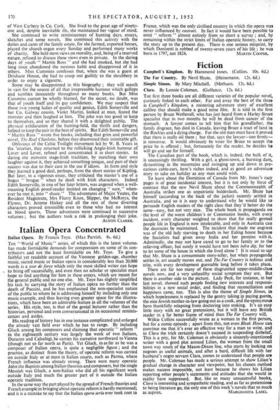• Fiction
THE first three books are all different varieties of the popular novel, curiously linked to each other. Far and away the best of the three is Campbell's Kingdom, a roistering adventure story of excellent calibre that should make a good tense film. It is told in the first person by Bruce Wetherall, who has just heard from a Harley Street specialist that in two months he will be dead from cancer of the stomach. A lawyer comes to tell him that his grandfather, the family disgrace, has died in Canada, leaving Bruce a tract of land in the Rockies and a dying charge. For the old man must have it proved that there is really oil there ; but that, says the lawyer—too firmly— is nonsense. It would obviously be wiser for Bruce to accept tho price he is offered ; but, fortunately for the reader, he decides he will go and see for himself.
The Canadian part of the book, which is, indeed, the bulk of it, is unceasingly thrilling. With a girl, a ghost-town, a bursting dam, dynamiting in the mountains and swinging up and down in pre- carious cable-cars, here's riches indeed, and as good an adventure story to take on holiday as any man could wish.
To learn about the Dominion of Canada from Mr. Innes's racy pages is of great incidental interest, but it is not only by force of contrast that the new Nevil Shute about the Commonwealth of Australia strikes one as unpatriotic balderdash. Mr. Shute has himself (according to the back of the jacket) recently settled in Australia, and so it is easy to understand why he would like to persuade English readers of the right class that they'd better do the same—easy, but not very nice. The whole book is propaganda on the level of the worst children's or Communist books, with every incident, every character weighted to show that for really genteel people life in England is now intolerable, and only in Australia can the decencies be maintained. The incident that made me angriest was of the old lady starving to death in her Ealing house because the Socialists had given away India and her pension with it.
Admittedly, she may not have cared to go to her family or to the relieving officer, but surely it would have not been infra dig. for her to let some of the house in which she lived alone ? It is usual to say that Mr. Shute is a consummate story-teller, but when propaganda settles in, art usually moves out, and The Far Country is tedious and trite, with every development guessable long before it takes place. There are far too many of these disgruntled upper-middle-class novels now, and a very unhealthy social symptom they are. But there is another side to the picture. Lady Peck, for instance, in her last novel, showed such people finding new interests and responsi- bilities in a new social order, and finding that reconciliation and happiness came, too. This is also the theme of Simple Simon, in which hopelessness is replaced by the gentry taking paying guests, the nice Jewish mother-in-law going out as a cook, and the eponymous hero thankfully relapsing from doctoring into stoking. It's an easy little story with no great pretensions, but it will leave any British reader in a far better frame of mind than The Far Country will.
Wilkie Collins successfully wrote as a woman in the first person, but for a comic episode ; apart from this, not even Bleak House can convince me that it's ever an effective way for a man to write, and in Clara the trick certainly doesn't succeed in suspending disbelief.
This is a pity, for Mr. Coleman is obviously a sincerely-intentioned writer with a good plot around Lilian, the woman from the small town way south of the Mason-Dixon line, who starts by looking on negroes as useful animals, and after a hard, difficult life with her husband's negro servant Clara, comes to understand that people are people. Mr. Coleman has made a serious attempt to show Lilian's gradual change in character and viewpoint, but his chosen method makes success impossible, not least because he shows his Lilian reporting other people's statements and attitudes that she would in reality have suppressed. But, like so many unsuccessful books, Clara is interesting and sympathetic reading, and as far as pretensions to being literature go, the only one of this week's novels that so much


























 Previous page
Previous page